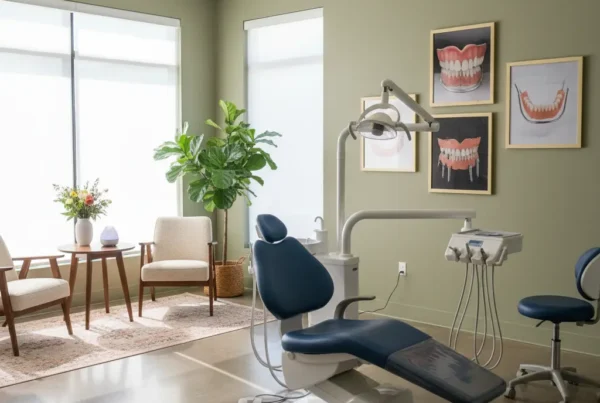Taking care of your partial dentures is like taking care of a special tool that helps you eat, speak, and smile confidently every day! With the right cleaning routine, proper products, and regular dental visits, your partial dentures can stay comfortable, fresh, and functional for many years. The key is understanding that partial dentures need their own special care routine that’s different from caring for natural teeth.
Building Your Foundation for Success
Proper partial denture care starts with understanding why these special cleaning routines are so important. Dr. Christopher J. Cappetta, with over 35 years of experience helping patients in San Antonio, Texas, has seen how good denture care can make the difference between comfortable, long-lasting dentures and constant problems. His expertise with the American Dental Association and Academy of General Dentistry helps ensure patients receive the most effective care instructions for their specific needs.
Your partial dentures are made from different materials than your natural teeth, which means they need different care approaches. The acrylic, metal, and other materials used in partial dentures can be damaged by products that are safe for natural teeth. Understanding these differences helps you choose the right cleaning products and techniques.
Daily cleaning prevents most problems before they start. Just like you wouldn’t skip brushing your natural teeth, your partial dentures need consistent daily attention to stay clean, comfortable, and odor-free. This routine becomes second nature once you establish the right habits and understand why each step matters.
Professional guidance makes all the difference in developing an effective care routine. What works for one person might not work for another, depending on the type of partial dentures, your mouth’s specific needs, and your lifestyle. Dr. Cappetta’s personalized approach ensures each patient receives care instructions tailored to their unique situation.
Fighting Bacteria and Plaque Effectively
Bacteria and plaque behave differently on partial dentures than they do on natural teeth, which means your cleaning strategy needs to account for these differences. The materials used in dentures can actually harbor bacteria in ways that natural teeth don’t, making thorough cleaning even more important.
Partial dentures create new surfaces and crevices in your mouth where bacteria love to hide and multiply. These areas can be challenging to clean with regular brushing alone, which is why specialized cleaning products and techniques are essential. Understanding where bacteria tend to accumulate helps you focus your cleaning efforts where they’re needed most.
The warm, moist environment of your mouth provides perfect conditions for bacterial growth. When food particles and bacteria combine on your dentures, they can quickly form biofilms that are much harder to remove than fresh debris. This is why cleaning your dentures promptly after eating helps prevent these stubborn bacterial communities from establishing themselves.
Key areas that need extra attention include:
- Metal clasps and attachments where bacteria can hide
- Surfaces that contact your gums and natural teeth
- Any textured or rough areas on the denture surface
- Spaces between denture teeth where food gets trapped
- The underside of the denture base
- Connection points between different denture materials
The health implications of bacterial buildup extend beyond just oral discomfort. Research shows that bacteria from poorly maintained dentures can contribute to respiratory infections, heart problems, and other serious health conditions. This makes proper denture hygiene an important part of maintaining your overall health, not just oral comfort.
Avoiding Common Cleaning Mistakes
Many people make innocent mistakes when cleaning their partial dentures because they assume the same rules apply as with natural teeth. Understanding these common misconceptions helps you avoid damage to your dentures and ensures your cleaning routine is actually effective.
Regular toothpaste is too abrasive for most denture materials and can create tiny scratches that become breeding grounds for bacteria. These microscopic grooves are impossible to clean thoroughly and can lead to persistent odor and staining problems. Using products specifically designed for dentures protects the surface while providing effective cleaning.
The timing and frequency of cleaning matter more than most people realize. While brushing twice a day works for natural teeth, partial dentures benefit from rinsing or cleaning after every meal when possible. Food particles that sit on dentures for hours can cause staining, odor, and bacterial growth that becomes much harder to address later.
Many denture wearers don’t realize that regular dental check-ups remain just as important as they were with natural teeth. Professional evaluation helps catch problems early, ensures your cleaning routine is effective, and allows for adjustments that keep your dentures comfortable and functional. These visits also provide opportunities to learn improved cleaning techniques and get updates on new products or methods.
Mastering the Unique Challenges of Partial Denture Design
Partial dentures have intricate designs with metal clasps, attachments, and connection points that create specific cleaning challenges. These areas require special attention and techniques to maintain proper hygiene without damaging the delicate components that keep your dentures secure and comfortable.
The metal clasps that help hold your partial dentures in place can accumulate bacteria and plaque in hard-to-reach areas. These components need gentle but thorough cleaning to prevent corrosion and maintain their grip on your natural teeth. Using the wrong cleaning techniques or products can damage these precision-made parts and affect how well your dentures fit.
Attachment points and connection areas create small spaces where bacteria can hide from normal brushing. These crevices require specialized cleaning tools like interdental brushes or denture picks to reach effectively. Understanding how to access these areas without damaging the denture helps maintain both hygiene and function.
| Denture Component | Cleaning Challenge | Recommended Approach | Tools Needed |
| Metal clasps | Bacteria buildup, corrosion risk | Gentle circular motions | Soft denture brush |
| Attachment points | Hard-to-reach crevices | Use specialized picks | Denture picks, interdental brushes |
| Acrylic surfaces | Scratching, staining | Non-abrasive cleaners only | Soft-bristled brush |
| Connection joints | Food particle accumulation | Thorough rinsing, gentle brushing | Water flosser, soft brush |
The mechanical retention system that keeps your partial dentures secure can be weakened by improper cleaning techniques. Vigorous scrubbing or using inappropriate tools can loosen clasps or damage attachment points, leading to poor fit and reduced comfort. Learning the right cleaning approaches protects these critical components while maintaining hygiene.
Developing Your Daily Care Routine
An effective daily care routine combines mechanical cleaning with chemical cleaning to address all aspects of partial denture hygiene. This two-pronged approach ensures thorough cleaning while protecting the materials and components that make your dentures functional.
Mechanical cleaning with a soft-bristled denture brush physically removes food particles, plaque, and bacteria from all surfaces of your partial dentures. The key is using gentle, systematic motions that clean thoroughly without applying excessive force that could damage delicate components. Focus on covering every surface methodically rather than scrubbing vigorously in problem areas.
Chemical cleaning through soaking provides deep cleaning that mechanical brushing can’t achieve alone. Denture cleaning solutions penetrate into microscopic spaces and dissolve deposits that resist brushing. This overnight soaking also helps maintain the shape and flexibility of your dentures while killing bacteria and freshening them for the next day.
Your daily routine should include:
- Rinsing after meals to remove loose food particles
- Thorough brushing with denture cleaner before bed
- Overnight soaking in denture cleaning solution
- Morning rinse before inserting dentures
- Gentle cleaning of your natural teeth and gums
- Inspection for any damage or changes in fit
Professional oversight helps ensure your daily routine remains effective over time. What works initially may need adjustments as your dentures age or as your oral health needs change. Regular dental visits provide opportunities to review your care routine and make improvements based on the condition of your dentures and your oral health.

Recognizing When Professional Help Is Needed
Learning to identify signs that require professional attention can prevent minor issues from becoming major problems. While good daily care prevents most denture problems, some situations require the expertise and tools that only a dental professional can provide.
Persistent odors that don’t improve with thorough cleaning often indicate problems that go beyond normal bacterial buildup. These odors may signal bacterial infections, poor denture fit, or accumulation of deposits that require professional removal. Don’t ignore persistent bad breath or unusual tastes, as these can indicate serious underlying issues.
Visible buildup of hard deposits or staining that resists normal cleaning typically requires professional intervention. Tartar and deep stains can damage denture materials if you try to remove them with abrasive methods at home. Professional cleaning uses specialized tools and techniques that can remove these deposits safely without damaging your dentures.
Discomfort, sore spots, or changes in how your dentures fit should never be ignored. These symptoms often indicate that adjustments are needed or that your mouth has changed in ways that affect denture fit. Trying to tough it out or using adhesives to compensate for poor fit can lead to more serious problems and expensive repairs.
Regular preventive visits allow Dr. Cappetta to catch problems before they become painful or costly. During these appointments, he can assess the condition of your dentures, the health of your mouth, and the effectiveness of your care routine. This proactive approach helps maintain optimal denture function and prevents most serious problems from developing.
Getting the Support You Need
Professional support goes beyond just fixing problems to include education, guidance, and resources that help you succeed with your partial dentures. Fountain of Youth Dental provides comprehensive support that empowers patients to take excellent care of their dentures at home while knowing when professional help is needed.
Customized care plans recognize that every patient’s situation is unique. Factors like the type of partial dentures, your natural teeth, your general health, and your lifestyle all influence what care approach works best. Dr. Cappetta’s experience allows him to provide personalized recommendations that fit your specific needs and circumstances.
Educational demonstrations help you learn proper techniques through hands-on instruction. Seeing the correct brushing motions, learning how to handle your dentures safely, and understanding proper soaking procedures makes it much easier to provide effective care at home. This visual learning approach helps ensure you’re using the most effective techniques.
Ongoing resources provide support between dental visits. Written instructions, educational materials, and access to professional guidance help you maintain confidence in your care routine. Having reliable information readily available means you can address questions or concerns promptly without waiting for your next appointment.
The team approach at Fountain of Youth Dental means multiple professionals are available to help with different aspects of your denture care. From hygienists who specialize in cleaning techniques to Dr. Cappetta’s expertise in denture adjustments and repairs, you have access to comprehensive support for all your denture care needs.
Your Path to Long-Term Success
Successful partial denture care is a journey that combines daily diligence with professional support and ongoing education. Dr. Christopher J. Cappetta’s 35 years of experience and commitment to patient education ensures that denture wearers in San Antonio have the knowledge and support they need for long-term success.
The investment in proper denture care pays dividends in comfort, function, and longevity. Well-maintained partial dentures can last many years while providing excellent service, but neglected dentures often require expensive repairs or early replacement. The daily time investment in proper care is minimal compared to the benefits it provides.
Understanding that denture care evolves over time helps set realistic expectations for your ongoing relationship with your partial dentures. As you gain experience and as your dentures age, your care routine may need adjustments. Dr. Cappetta’s ongoing support ensures these changes happen smoothly and effectively.
The confidence that comes from knowing you’re providing excellent care for your partial dentures enhances every aspect of your denture-wearing experience. When you know your dentures are clean, well-maintained, and professionally supervised, you can focus on enjoying the benefits they provide rather than worrying about potential problems. This peace of mind is one of the most valuable benefits of establishing good denture care habits from the beginning.
See More Reviews From Fountain of Youth Dental. View information about local places in our community.
Schedule Your Free Consultation Today!
Fountain of Youth Dental
5282 Medical Dr. #520 San Antonio, TX 78229 (210) 614-5481 Driving Directions
Frequently Asked Questions
What’s the best way to clean my partial dentures daily?
Clean your partial dentures daily with a soft-bristled denture brush and non-abrasive denture cleaner, using gentle circular motions to avoid damaging delicate components. Soak them overnight in a dentist-approved cleaning solution to kill bacteria and dissolve deposits that brushing can’t remove. Always rinse thoroughly before putting them back in your mouth.
How often should I visit the dentist for denture care?
Schedule dental check-ups at least twice a year, or more frequently if you experience any problems with fit, comfort, or cleanliness. Regular visits allow your dentist to monitor the condition of your dentures and your oral health, make necessary adjustments, and provide updated care instructions. Professional cleaning and evaluation help prevent problems before they become serious.
Can improper denture care affect my overall health?
Poor denture hygiene can definitely impact your overall health by allowing harmful bacteria to multiply in your mouth and potentially enter your bloodstream. This can contribute to respiratory infections, heart problems, and other serious health conditions. Maintaining excellent denture hygiene is an important part of protecting both your oral health and your general well-being.





